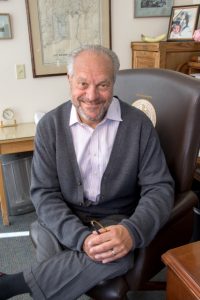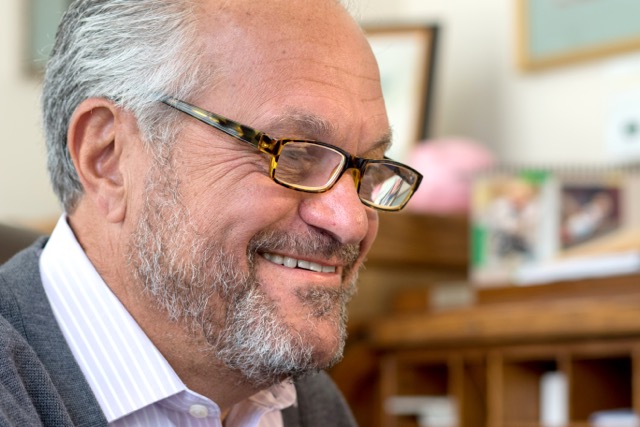Trying to get former New Haven Mayor John DeStefano, Jr. to give his political views these days is a difficult – if not impossible – task.
It’s not because he’s being contrary. Quite the opposite; the man who spent 20 years running the city is in a different, much more tranquil place these days.
There is a lot he’ll talk about – his current job as executive vice president of START Community Bank, not working 15-hour days and weekends, his two homes in New Haven and Florida, and teaching at Yale University.
And he’ll talk about his family, especially his new granddaughter, pointing proudly to a picture of her in his office.
“Isn’t she beautiful?” he beams. “Being a grandfather is everything everybody says it would be. I love it.”
DeStefano would just rather not talk politics.
“I loved serving as mayor,” says the 63 year old. “But that’s done and over with. I had my time. I just don’t feel the need to be the critical. What purpose does that serve?”
To this day, many in the city still refer to DeStefano as “Mr. Mayor.”
“I feel very lucky. I saw a lot of people leave office because they lost. I picked the right time to walk away,” he says. “It’s good to leave while most people want you to stay. I miss the people, but I don’t miss the fights.”
Those fights, he admits, took their toll.
“It made me short with people at times,” he recalls. “I do regret that, looking back. At times, the pressure got the best of me.”
These days, many see a more mellow DeStefano.
Journalist Paul Bass has covered DeStefano for decades, first as a reporter at the New Haven Advocate and then as the editor of the New Haven Independent.
“John has had a Jimmy Carter-like transition, in my opinion – thriving in retirement as an active, engaged elder statesman influencing our community in positive ways, from his teaching to his stewardship of the bank to his open ear to anyone seeking advice,” says Bass.
“He’s still making a difference while clearly enjoying the peace that comes from not having to engage in the political fight,” Bass adds. “And he has made a point not to trash people still in that fight. This has been the most respectful dynamic I’ve observed between a former and current mayor in 40 years.”
DeStefano is proud that when his tenure as mayor was over it was, well, over.
After deciding not to seek an 11th term, on New Years’ Eve 2013 – technically his last day in office – he and his wife Kathy, “really had a blast at a Billy Joel concert at the Barclay Center in New York.”
“The next day was New Year’s and the following day I came to work at the bank,” DeStefano remembers.
He is charged with growing the bank, making it profitable, and “furthering [its] community development activity.”
“We are growing, doing well. We have a well-performing portfolio,” DeStefano says, noting a key part of the bank’s mission is to help low- and moderate-income business owners prosper.
“In some ways, it is very much an extension of my work at City Hall,” says DeStefano.
START opened in December 2010. It grew out of a contentious battle years earlier over the sale of the old New Haven Savings Bank, the city’s last major mutual depositor-owned community bank, to what was then NewAlliance Bank, later First Niagara and now KeyBank.
As mayor, DeStefano helped lead a protest movement against that sale. The ensuing negotiations with state regulators led to NewAlliance agreeing to set aside tens of millions of dollars to form a not-for-profit institution committed to lending money to businesses and families in the city. That institution, First City Fund Corp., formed in 2004. It then formed START as a for-profit subsidiary.
Rolan Joni Young, who chairs the bank’s board of directors, says DeStefano has opened up myriad opportunities for the bank.
“His unique name recognition, combined with his whole range of business background, experience and expertise has been invaluable to us,” says Young. “Few people, if any, know New Haven and its people like John DeStefano.”
While he doesn’t want to be dragged into a discussion about local, state or even national politics, DeStefano doesn’t mind talking about issues other than banking.
“New Haven’s biggest problem is the state of Connecticut,” DeStefano says. “The overall lack of job growth and wealth creating is killing Connecticut and, therefore, that trickles down to cities like New Haven.”
DeStefano cites his own two grown children, Dan and James, as people impacted by the state’s economy.
“One lives in Guilford, one lives out of state, but neither work in Connecticut,” he says. “There’s way too many examples of that in our state.”
DeStefano says one benefit of not being mayor is being able to spend more time at home both in New Haven, where he has lived for more than three decades, and at his family’s new second home in Florida. He and his wife, a retired West Haven school teacher, split time between the two.

“I still love being in New Haven, I love my Judwin [Avenue] house” says DeStefano, “but I can see myself spending more time in Florida down the road, too.”
DeStefano also teaches a political science course at Yale, where he enjoys bantering about issues with the students.
DeStefano did reflect, in an interview in his bank office, “on some of the good we did” during his two decades in office. He ticked off immigration reform, community policing and other “social capital” issues as high points.
One of DeStefano’s biggest initiatives was a controversial plan to issue official city identification cards to residents, including undocumented immigrants.
Critics said the proposed program would encourage illegal immigration. Those who supported the idea argued that undocumented workers were already living in the city. The cards, they said, would allow undocumented immigrants to access city services and bank accounts and bring them under a certain degree of government supervision. The city began issuing the cards on July 24, 2007.
DeStefano focused much of his tenure as mayor on improving education and public safety, as well as on economic development.
Notable achievements included the Livable City Initiative, begun in 1996, which promoted homeownership and removed blight. In 1995, DeStefano launched a 15-year, $1.5 billion school construction program to replace or renovate every New Haven public school.
He is widely credited for crafting a strong partnership with the city’s most successful and prosperous enterprise, Yale University. He also was president of the Connecticut Conference of Municipalities and president of the National League of Cities.
DeStefano once made a gubernatorial bid, defeating Dannel P. Malloy in the 2006 Democratic primary but losing the general election to Republican M. Jodi Rell.
The economic issues Connecticut faces aren’t unique to here, says the former mayor.
“America has been changing in a lot of ways the past several decades,” DeStefano says. “It’s clear this economy is leaving a lot of people behind. For the Democratic Party to become a real force again, nationwide, it needs to be part of the communities. That’s what it comes down to.”
But DeStefano quickly shifts the conversation back to less weighty issues, following that thought with discussions about his upcoming weekend plans.
He’s clearly a man looking ahead, not back.
Photography by Tony Bacewicz







More Stories
Over 50, Underestimated: The Grandfluencers Redefining Age on Social Media
Building Resilient Businesses: Strategies for Success
Summer Means Convertibles